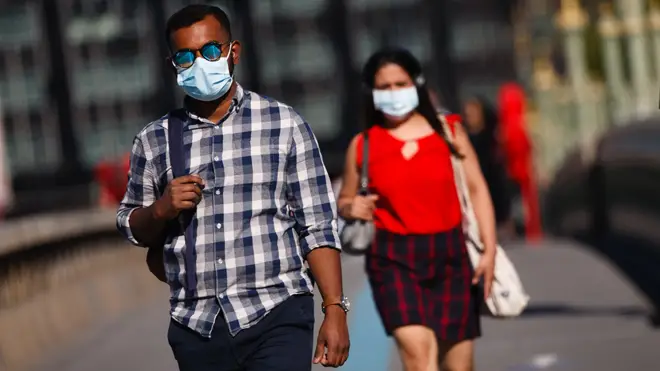
Shelagh Fogarty 1pm - 4pm
8 September 2020, 09:30 | Updated: 16 November 2020, 19:23

Tens of thousands of people have been suffering symptoms of coronavirus for more than three months, reports suggest.
Professor Tim Spector, who is leading the Covid Symptom Study app, said that 60,000 people have been ill for more than three months with so-called 'long covid.'
While some people have a mild form of illness, others have been seriously affected.
People affected with long-term symptoms have described how they have been previously fit and healthy and now they are confined to a wheelchair.
Breathlessness and fatigue have been reported by long-term sufferers and some have described how doing shopping or climbing stairs can leave them bed-ridden for days.
Prof Spector, professor of genetic epidemiology at King's College London, told BBC Radio 4's File On 4 that data from the app shows that around 300,000 people have reported symptoms lasting for more than a month - so called "long Covid".

Hancock: NHS will have 40 'long-Covid' centres in place by end of month
Up to 60,000 people reported having symptoms for more than three months.
On Monday, Health Secretary Matt Hancock said that some people were still experiencing symptoms six months after contracting the virus.
Speaking on LBC radio, Mr Hancock said: "Long Covid, where people six months on are still ill, is prevalent among younger people."
But Professor Spector said he is "frustrated" that data from the app is not being more widely used.
"There's a big danger these (people) might end up being forgotten," he told File On 4.
Meanwhile, the programme asked commissioning groups and health boards across the UK whether they had set up post-Covid clinics for patients who were not admitted to hospital with the virus.
Of the 86 who responded, 10 said they were already running such facilities. A further 16 said they were planning or redesigning services.
Many patients will be seen by their GP, or existing services.
NHS England's new Your Covid Recovery website offers personalised support for all patients recovering from Covid.
Lynne Turner Stokes, professor of rehabilitation medicine at King's College London, told File On 4 the website had some "good resources" but that "we have to do much more".
A spokeswoman for the NHS in England said: "At the same time as treating more than 108,000 coronavirus patients and keeping other vital services running throughout the pandemic, the NHS has played a leading role in patient recovery and scientific discovery which is saving lives here and around the world.
"While experts globally continue work to understand more about the short and long-term impact of this new disease, NHS teams are rapidly expanding aftercare and support to all patients who need it, including new and strengthened rehab centres and community services providing tailored treatment in every part of the country, such as the first of its kind Seacole centre, and a new online health advice and support platform, which patients said they wanted to help them recover at home."
It comes as new guidance published on the Government website sets out some of the long-term health effects for some people who have had Covid-19.
The guidance states that around 10% of mild coronavirus cases who were not admitted to hospital have reported symptoms lasting more than 4 weeks.
And a number of people admitted to hospital reported continuing symptoms for eight or more weeks following discharge.
Persistent health problems following acute disease have included: respiratory symptoms and conditions such as chronic cough, shortness of breath; lung problems including inflammation and scarring; heart issues including chest tightness, heart failure and scarring; protracted loss or change of smell and taste; mental health problems including depression, anxiety and cognitive difficulties; inflammatory disorders such as muscle pain; gastrointestinal problems; continuing headaches; fatigue, weakness and sleeplessness; liver and kidney dysfunction; clotting disorders and thrombosis; problems with the lymph nodes and skin rashes.
Meanwhile, researchers in Glasgow have launched a study examining the long-term health impacts of Covid-19.
The study will measure prevalence and risk factors of long-term health and psychosocial consequences of the disease.
Experts are recruiting hospitals and healthcare sites around the world to join the study.
Dr Janet Scott, of the MRC-University of Glasgow's Centre for Virus Research, said: "It is vitally important that we are able to understand the long-term risk factors and health conditions associated with Covid-19, in order to ensure we are delivering the very best healthcare to patients in the long term.
"In order to do this, the assessment of risk factors for longer-term consequences requires a longitudinal study, with data on pre-existing conditions and care received during the acute phase of the Covid-19 illness all linked together."